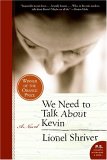Reading Guide Questions

Please be aware that this discussion guide will contain spoilers!
Introduction
In a series of compelling and introspective letters to her estranged husband, Franklin, Eva Khatchadourian dissects her married life and her mothering of her son Kevin and daughter Celia in the aftermath of Kevin's Columbine-like school slaying of seven classmates, a cafeteria worker, and a teacher.
Worried that her son's murderousness might have resulted from her deficits as a mother, Eva probes the most intimate and shocking aspects of her inner life, her marriage and her resentment of motherhood. This literary page-turner tackles the sensitive proposition that mothers can be unmoved by -- and even dislike -- their own children. Eva struggles with her lack of ready emotion when Kevin is first placed in her arms and with the subsequently hellish years of parenting a boy who both refuses to speak until the age of 3 and be potty trained until the age of 6, and who seems to enjoy nothing but the taunting of his mother. Having dramatically scaled back on her satisfying and profitable career, Eva becomes a stay-at-home mom who discovers that her son, while seemingly slow, is whip-smart and vindictive -- and cunning enough to play for his father with disastrous results.
We Need To Talk About Kevin is a searing and complex look at the reasons couples decide to have children, the parent-child relationship, marriage, and the limits of love and loyalty.
Questions for Discussion
- Non-maternal, ambivalent mothers are one of the last taboos -- and Eva is a prime example. Were her motives for having a baby entirely selfish? And if so, how much can that have factored into the outcome of an abnormally difficult baby and apathetic child? In contrast to Kevin, Celia was loving, needy and sweet -- and her mother's favorite, if not her father's. By the very end of the novel, has Eva's love for Kevin, or at least her primitive loyalty to him, finally become unconditional? How does this fit in with the feminist ideal of motherhood?
- Is Eva's view of Kevin colored by her ambivalence about motherhood in general, or perhaps by hindsight knowledge of his eventual violence? Is Eva responsible for creating a child she sees as a monster, or was he a monster all along?
- Eva's tone changes throughout the course of her letter-writing. She is in turns angry, frustrated and mystified. Could you describe Eva as a loving mother -- in deed if not in thought? Was Kevin overly indulged by a parenting style that let him potty train and learn at his own pace?
- Did the inclusion of a child into Eva and Franklin's stable, loving relationship cause the rift between them? Did the fact of a child threaten their marriage? How was Kevin perceived as a threat by Eva from conception? What expectations did Eva have of motherhood and how did she meet the reality of it? Was Franklin unsupportive of Eva?
- The irony of Eva having read Robin Hood to an ailing, needy Kevin at a time of almost shocking mother-son bonding is played out in the way Kevin massacred his fellow students and the teacher who took an interest in him. Since it is Eva who connects Kevin's fevered state with her recollection of his unusual interest in anything whatsoever, is it possible that Kevin's methods were meant to figuratively slay his mother?
- After Eva throws Kevin across the room, she takes him to the hospital. She confesses later on to Franklin, "However much I deserved rebuke, I still preferred the slow burn of private self-excoriation to the hot lash of public reproof." Are Eva's letters to Franklin her form of self-excoriation, though she is suffering public reproof as the mother of a mass murderer?
- Does Eva feel responsible for Kevin's series of nasty deeds and childhood "pranks?" Does she think she could have prevented any of it? Does she come to realize why Kevin would harm other children or does she give up trying to understand? How can we sympathize with a mother and father who saw all the warning signs but failed to stop the violence?
- Given that the story is told from Eva's perspective only, can she be trusted as reliable? How do you think Franklin's version of events would have differed? Might Eva choose to portray Kevin in childhood as more wicked than he really was, if only to make her seem less culpable for his crimes as a teenager?
- What were Eva's reasons for having a second child? Did Franklin forgive her for the deception? Was she repentant? How closely were her expectations met and was she gratified? How did Franklin's attitude toward Kevin and Celia differ?
- Toward the end of the novel, it is revealed that Kevin has more complicated feelings about his mother and some of the 9 people he murdered. This gives us a hint as to why he might have carefully planned and carried out Thursday. Does he seem pathetic or more deserving of compassion because he may have had a motive, after all?
- At the conclusion of the novel, did you find Eva sympathetic in a way you may not have initially? Do you think Eva has sympathy and forgiveness for herself? Is she able to accept Kevin, and to see his personality as, however uncomfortably, akin to her own?
Unless otherwise stated, this discussion guide is reprinted with the permission of Harper Perennial.
Any page references refer to a USA edition of the book, usually the trade paperback version, and may vary in other editions.







